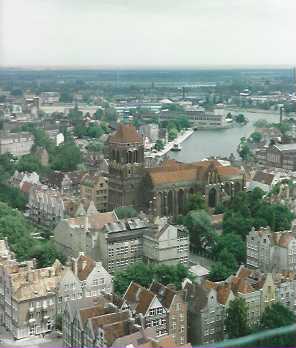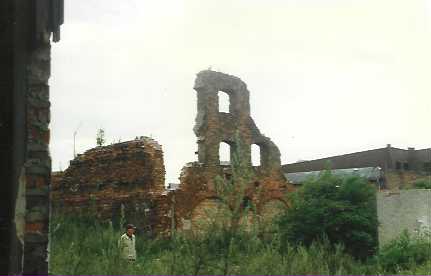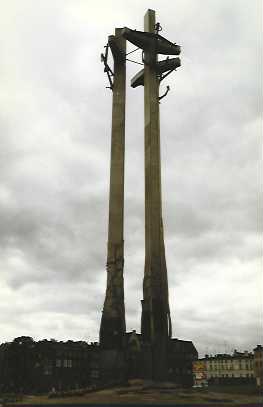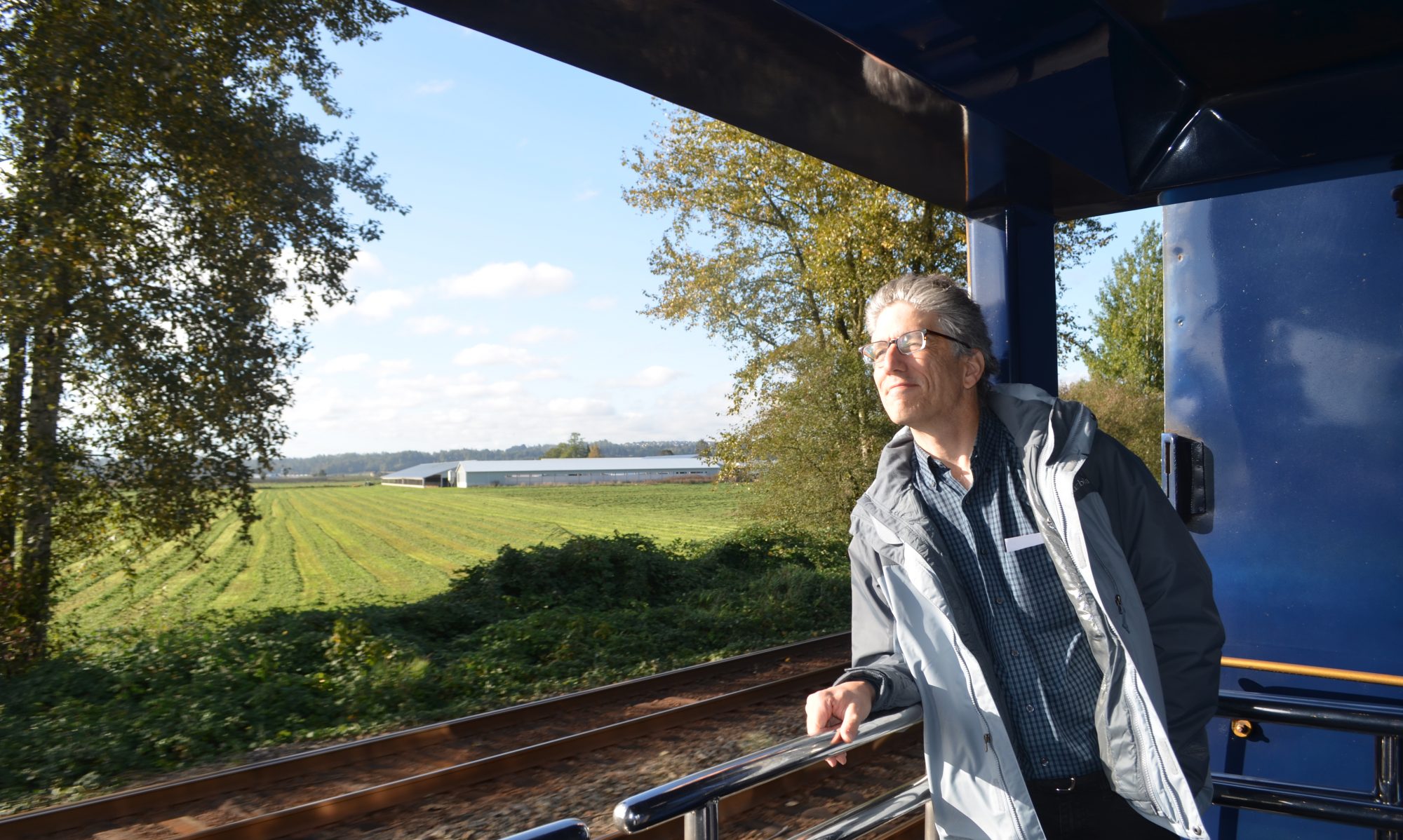A Bad Gday in Gdansk

I didn’t want to take any chances. So, I got the fun part out of the way first. Instead of going directly to Warsaw, Krakow, Auschwitz and my grandfather’s hometown of Lodz, I opted for Gdansk first, even though it was way out of my way. I went because I wanted to chase headlines and see where the Solidarity movement was born.
It was an exceedingly strange journey.
Before I boarded a bus to the border, I helped the driver load bags as his elbows smashed into my glasses while I was wearing them. It happened so fast and the impact was so great he drew blood. Then he had the nerve to ask for 3 Lit in addition to the money I’d already paid for my bus ticket. I paid, but not without protest. I’m still not sure if it was good thing he didn’t know English, but at least it allowed me to vent frustration.
Next, there was the mysterious stop 20 minutes east of the border. The bus driver pulled to the side of a country road miles from any station and a man and a woman who weren’t there seconds before materialized and loaded 10 large pieces of luggage onto the bus. These were not unobtrusive people. When they brought their bags on, they inconvenienced everyone, getting some passengers to help with the loading, forcing others to move bags to make room, to the irritation of everyone on board. Ten minutes after we crossed the border the bus stopped, they got out, unloaded, a car appeared and then they were gone.
They weren’t hassled at the border, but I was. On the Lithuanian side of the border the guard made me take off my glasses so he could compare the live bearded, curly-haired guy he saw with the almost 10 year-old passport picture of a clean-shaven guy having a bad hair year. After much staring, he finally let me go. On the Polish side, the guard looked at my passport long and hard for about two minutes, took it away, left the bus and disappeared into a building for five minutes. He was away so long the bus driver forgot we were waiting, so he started the engine and was leaving when the guard stopped him.
The cavalcade of oddity continued. Once the bus stopped in Sulwaki I
was confronted with a chronic problem that dogged me throughout the trip. I needed to go to the bathroom, but didn’t have any foreign exchange (zloty) to pay admission. A bathroom attendant at the bus station agreed to watch my bags while I went to get zloty. For a price even though I didn’t have any money. He was willing to carry my debt because he knew I’d be back.
Who says the only sure things in life are death and taxes? I’m thinking bathroom going would also make that list.
I cashed just enough of my $100 worth of Lithuanian Lit to cover my train ticket, food along the way and a few restroom stops, figuring that I would be able to get a better exchange rate once I got to Gdansk and found an exchange that wasn’t right at the train station. Then I went to the train station and bought a ticket for a train leaving in 90 minutes.
Once I returned to the bathroom the attendant wanted to chat and have me over for coffee. Since I’d only been in Poland less than an hour, I didn’t know any Polish and I couldn’t find my phrasebook so I had to rely on the useless general language section of my guidebook. As the halting attempt at conversation dragged on, however, I got
more fidgety because the exchange had taken 15 minutes, there was no end in sight and I still had a 10-minute walk back to the train station ahead of me.
Fortunately, a Polish woman whose boy had to go to the bathroom happened on the scene and translated as best she could. As it turns out, the attendant was telling me he was not only glad to watch my bags for 15 minutes, he would be happy to watch my bags for several days if I wanted to travel without them. It took me another 10 minutes to explain I was leaving town and had no plans to come back. (It’s funny how things change, but that’s a story for another chapter).
The day’s adventures in bathroom going were just starting.
I had to go again shortly before my train arrived, so I walked to a free-standing trackside structure housing toilets, went to the side housing the men’s room and opened the door. Or at least, attempted to do so, but couldn’t because it was locked. This bathroom was unusual because the front door had a peephole so that the proprietor, pissboy or whatever he’s called could look at the patron and see…what I’m still not sure. Maybe he was afraid of toilet theft or perhaps when the Soviets overran the country they saw bathrooms as a more important first objective than cutting the lines of communication.
Bathroom going at the next stop in a town called Elk appeared to be an even bigger deal. Now that I was in a slightly bigger burg there was apparently a greater need for septic security because the attendant here wanted to know what my intentions were: urinal or toilet? (“Pisoir? Kabina?” is the way she put it.) When I told her she held up one finger. I would have corrected her and said I needed to do number two, but, for all I knew this country may have reversed what the numbers stood for. This was the home of the Polish joke, after all.
As I neared the stalls I soon understood why she used one finger. She wanted me to go to stall number one because all of the stalls were electronically locked and she had to press a switch to disengage the lock. Again, I’m not sure why. Perhaps it’s because there have been so many partitions of this part of Poland that they want to make sure they can control access to the bathrooms, especially if the troops invade by train. The policy adds new meaning to “giving aid and comfort to the enemy.”
I wasn’t anyone’s enemy, but I was having a hard time getting aid or comfort once I got on the train. Since the ticket was in Polish, I couldn’t tell what my assigned seat number was or if I had one, and couldn’t find anyone to ask. Fortunately, I showed it to a couple of 20 year-old guys who told me they were going to a rock concert. They stared at it, then invited me into their cabin even though they spoke little English.
How was I to know they were stowaways?
If they weren’t stowaways then, at the very least, they were riding in a first class compartment that had been reserved by someone else down the line. They were getting away with it, however, because they knew the conductor. At least, I hope they knew the conductor because when he stepped into the compartment one of the concert goers put him in a headlock and began rubbing a fist on the hapless official’s head. Consequently, the conductor never asked to see their tickets. Or mine.
We sat around drinking beer and trying to overcome the language barrier even though I really didn’t want one beer, much less two. I still don’t know what it is about me and drinking in first class compartments on trains.
Once the concertgoers left they were replaced by five economic students going to take college entrance exams in a town I still can’t pronounce. They were the ones who pointed out the piece of paper taped to the door saying that the compartment had been reserved out of Olzstyn (which sounds remarkably like “Austin.”). We talked for about an hour then turned off the lights and slept. I set my alarm for 3 a.m. so I would be awake when the train rolled into Gdansk at 3:15. I didn’t need the alarm, though, because we were kicked out of the compartment at 1 a.m. and had to stand in the corridor the rest of the way.
I had to go to the bathroom something fierce by Gdansk and worried the station’s bathroom might not be open because it was so late and I wasn’t sure it had a 24-hour train station.
I needn’t have worried. Not only was the station’s bathroom open, the place also had showers for 4 zloty and there were two attendants on duty to make sure that everyone paid. It cost 1 zloty to go, regardless of what you planned to do.
Once I finished I made sure I had a 2 zloty coin, which I put on the bathroom counter so I wouldn’t have to dip a wet hand into my pockets to search for change. I couldn’t find it when I went to pay so I ran back into the bathroom despite the attendant’s yells not to. As it turned out, the coin was in my pocket after all. Although it only cost one zloty to go, the attendant wouldn’t give me change because I had gone in twice.
“But I didn’t use it twice,” I said.
“It doesn’t matter,” she said. “I have to charge you because the computer recorded you going in and out.”
Somehow, I thought computers were destined for finer things. I had heard of some software packages being shitty, but this is not a use I would have thought of. The whole exchange made me feel as though I’d just entered a country where school bathroom monitors go when they graduate.
“Geeze,” I mumbled to myself, “Why don’t they just install car alarms on the seats and be done with it?”
It had been 48 hours since I had gotten more than a few minutes of sleep at one shot and napping in the train stations’ waiting room chairs wasn’t cutting it, so I checked my bags and sought out the city’s Youth Hostel. I knew it wouldn’t be open at 5 a.m., but I needed to find out where I’d be staying.
I’d heard of hostels that went by the book, but never came across one until Gdansk. Hostels are supposed to kick everyone out at 10 a.m., close for cleaning and not reopen again until 5 p.m. Even so, I didn’t think my request was out of line. I got there at 7 a.m. and offered to pay for the night so I could sleep until 10, but the warden (what an appropriate title) would have none of it. So, I wandered the streets wondering what to do until I saw a travel agency that booked home stays. I asked the worker if she knew of any cheap hotels nearby where I could sleep NOW! I told her I meant hostels or hotels, but she kept flipping through her book of homes available for tourists to visit. When she couldn’t find anything, she finally called a cheap hotel nearby to see if it had a room. They did, at 25 zloty (about $10 US), but said I’d probably have to wait until it was cleaned. Still, I reasoned, it was better than waiting until 5 p.m. to sleep.
I also told the travel agent I was short of zloty because the exchange places (kantors) didn’t accept Lithuanian money and asked if she knew of any place that did. She said a kantor along the way would probably do so even though it was only 8 a.m. on a Sunday, not one of the biggest business days in a predominantly Catholic country.
No such luck.
Fortunately, the clerk was sympathetic and said she would take dollars instead. I had dollars, but not enough to cover it and she wanted it in one currency, so she sent me to a kantor at the Novotel, which she insisted would be open. Once I had the money and could pay in advance, she would let me have the room. She also said she would tell the person on the next shift about our arrangement.
The problem was that if I converted my $5US to zloty and combined it with the zloty I already had I would only have 5 zloty left until Monday, which wouldn’t buy a decent meal or get my bag back. Fortunately, I remembered I had some dollars at the bottom of my pack. They were creased and yellow from contact with some medicine that had broken in my pack, but I figured I could exchange the whole lot for zloty and have enough to eat. The unforeseen flaw in this theory is that kantor operators are anal about what condition the money they accept has to be in and most won’t accept creased or wrinkled bills. When the kantors balked at my bills, I used all of the US dollars to pay for my room, sneaking all of the unacceptable bills in with the acceptable one and prayed the clerk didn’t notice.
The plot thickened because the night clerk didn’t tell her successor about our agreement and he balked until I bullied him into it. After closing the cash drawer he told me to come back at noon even though the previous clerk said I could have a room that was supposed to be cleaned by 10. Sleepless, angry and trying to look pitiful, I pitched a fit until he relented. I felt bad about the explosion, but desperate times called for desperate measures.
I slept until 2 p.m. then snuck out for a bite, using credit cards the rest of the day (the hotel didn’t accept plastic) except at the train station claim room where I needed cash. I was so embarrassed at using American Express in the Vietnamese restaurant where I ate, considering how cheap it was, that I actually found myself ordering extras to pad the bill. Even with all my efforts it was only $10.
I’m still puzzled why a Pole would think it was a good idea to open a Vietnamese restaurant. It wasn’t as if there were any Vietnamese eating or working there, but there it was in the middle of the old city. Puzzling.
Having had sleep and food, I felt so amazingly good I started to laugh at an exchange at a nearby table where a father was trying to convince his son that what was on his plate not only was what they had ordered, but also was edible. The boy remained unconvinced.
It was the first time I could remember laughing in days. My sense of humor returned and I hadn’t known it was missing. As I left the restaurant I felt energized. The sun was shining, the birds were singing, it was a bright Sunday afternoon and all was right with the world.
With the unexpected clarity that only rest and a good meal can bring, there also came the guilt that only being Jewish can generate. I felt so bad for yelling at the clerk and pulling a fast one I apologized and offered to replace the dollars with zloty the next day. Although he seemed to grant forgiveness, he waited a few seconds then set in on me because he’d noticed the condition of the five I gave him and wanted zloty instead. (I didn’t tell him I had seven zloty left because it wouldn’t cover the cost of the room and I didn’t want to be left zlotyless. It just seemed like a bad idea.) Each time I tried to offer to replace the bill with zloty early the following morning the clerk cut me off until I finally had to cut him off by saying, “If you would just let me finish…” I felt bad about being so rude even though I said it as nicely as possible. He begrudgingly accepted my offer.
What else could he do? I couldn’t very well go up to my room and mint the money, could I?
I slunked out of the hotel at 4 p.m. and noticed something I’d missed during my early struggles in the city: Gdansk is lovely. What made the beauty even more surprising to me was that I never expected it in a city known for its shipyards. Instead, I’d pictured something closer to the industrial area surrounding the tide flats in Tacoma and the river bottoms in Northeast Kansas City. Instead, it’s an attractive medieval city whose history stretches back more than a thousand years.

The town center’s history goes back to the days of the Hanseatic League when it was one of Europe’s richest ports. Although it owed its loyalty to Polish kings for more than 300 years, Gdansk was a free city belonging to neither Poland nor Germany between the wars. All that ended Sept. 1, 1939 when the German ship Schleswig-Holstein (sounds like a nasty disease affecting Midwestern cows, doesn’t it?) started the war by firing on a military depot near Gdansk. The city was a military objective because Hitler wanted a German controlled road and rail route across Poland to East Prussia, LP says. The book also says smoke stacks and industrialization have left Gdansk with a terrible pollution problem. I’m sure the pollution is there, but I didn’t see it in the old city.
What I noticed as I wandered was the Gothic architecture everywhere in the old quarter from the gates kings used to enter the city all the way to the Dutch Renaissance style armory called the Great Arsenal, which is topped by statues of soldiers guarding the city and festooned with military designs. My favorite part of town, though, is St. Mary’s Street, which LP calls the most picturesque in Gdansk because it’s lined with houses once owned by the city’s burghers. If the bobbing and weaving of camera-toting tourists focusing on buildings throughout the street are any indication, most tourists agreed.

The old bombed-out granaries on the other side of Matlawa River served as a reminder of the devastation the city experienced as World War II ended. The Nazis held the Gdansk most of the war, building ships with Polish slave labor, but lost it to the Russians in March 1945 in fighting so fierce that much of the area was decimated and had to be rebuilt. The reconstruction took 20 years. It’s so good it’s hard to see where the old ends and new begins.
The shipyard, however, was a disappointment. The only part open to the public is a brick courtyard outside the entrance with the Monument to the Shipyard Workers — a set of three 40-meter-tall steel crosses with bronze bas reliefs in their bases — in the middle. The sculpture honors the 30 people killed by the country’s Communist government during the riots that were part of the shipyard’s uprising in December 1970. The effort didn’t completely break the city’s independent spirit, however. It took almost two decades, but the shipyard became a hot spot again in the 1980s when protests by Solidarity members put the first chink in the armor of the Communist Party in Poland and much of Eastern Europe.

There was also a small stand selling Solidarity souvenirs including Solidarity flags, key chains and pictures of ex-Solidarity leader, President Lech Walesa.
I finally got into the hostel the next day and spent much of it hanging out with a Brit I met as I moved in. As I was leaving for the day, I saw a cute woman carrying the LP Poland book. Since I was planning to visit Lodz and my Eastern Europe book didn’t mention the city at all, I asked if I could borrow her book later. She agreed reluctantly.
When we caught up with her that night she was with her boyfriend and they were in crisis. They wanted to spend the night together but the couples’ rooms were gone and the only place they could sleep together was the luggage room. That meant convincing the same warden who wouldn’t let me sleep a few hours the day before to move all of the bags out of the room and into her office overnight. We chatted with them while they awaited her ruling. Once we learned her boyfriend was a native, we peppered him with questions. To my surprise, he was better informed than most locals I’ve ever met, answering questions authoritatively with the conviction of a newspaper reporter who knew his beat. As the conversation continued, the Brit flipped through the guide to Poland and stopped suddenly. He then looked at the first page and up at the woman’s boyfriend, then back down again. As he did so, the man smiled slowly.
It was the same guy who was standing in front of us. He was updating the book.
The chance meeting allowed us to praise LP and complain about the features that irritated us most. It was an unexpected chance to vent about the thing that I hated the most on this trip next to cold showers: LP’s god-awful maps of Southeast Asia. At least it was nice to know LP’s writers did field work.
